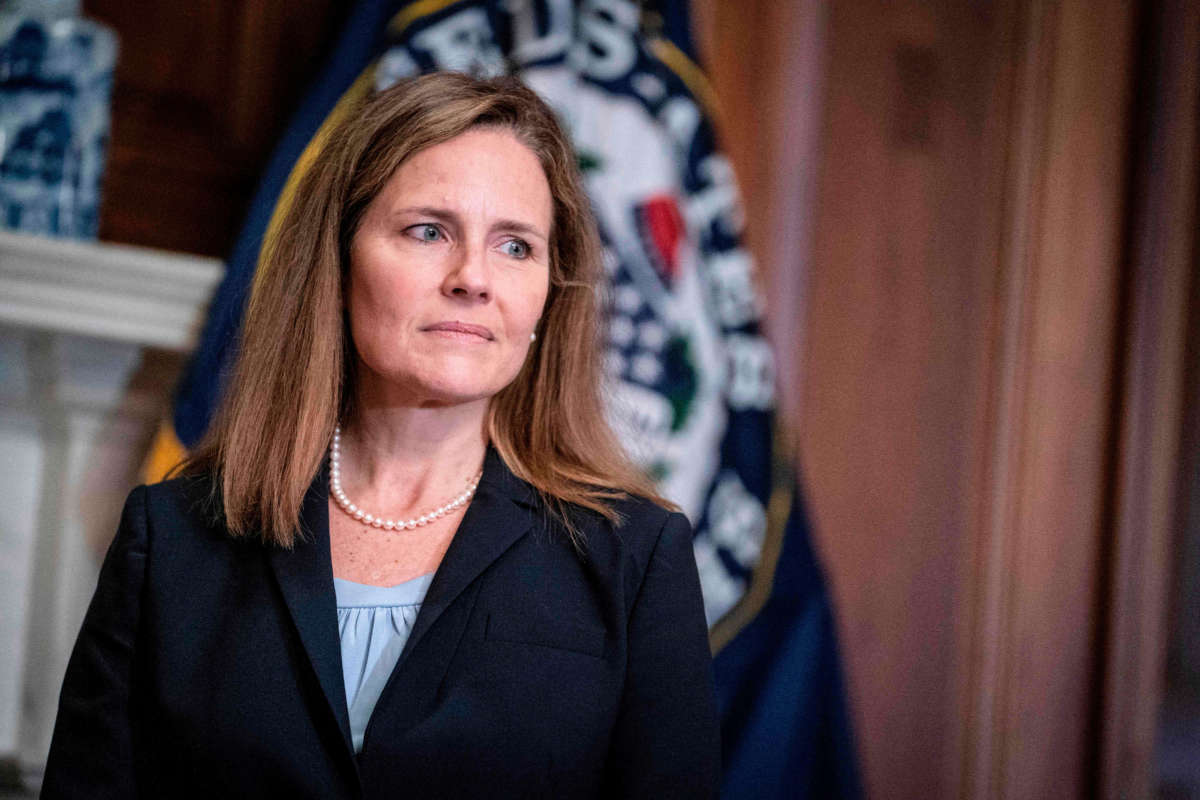Amy Coney Barrett, President Trump’s pick to replace the late Justice Ruth Bader Ginsburg on the United States Supreme Court, signed onto an anti-abortion open letter in 2006 penned by an organization that believes life begins at fertilization, even when outside of a person’s womb.
The group’s views are so extreme that they even believe assisted reproductive methods like in vitro fertilization (IVF), which discards excess fertilized embryos, should be a criminal offense, The Guardian reported.
The open letter was produced as a full-page newspaper advertisement by an anti-abortion group called St. Joseph County Right to Life. Published in South Bend, Indiana, the ad included hundreds of signatures of support from individuals in a region of the state called Michiana (near the Michigan-Indiana border). Among the signers were Barrett and her husband, Jesse.
“We, the following citizens of Michiana, oppose abortion on demand and defend the right to life from fertilization to natural death. Please continue to pray to end abortion,” the ad said.
The ad also decried Roe v. Wade, the landmark decision legalizing abortion, as “barbaric” and a “raw exercise of judicial power.”
Speaking to The Guardian about the matter this week, Jackie Appleman, executive director of the St. Joseph County Right to Life, confirmed that the organization is indeed morally opposed to IVF.
“Whether embryos are implanted in the woman and then selectively reduced or it’s done in a petri dish and then discarded, you’re still ending a new human life at that point and we do oppose that,” Appleman said.
It isn’t clear whether Barrett subscribes to the same views on IVF, as what she signed didn’t explicitly address that issue. But her support of the group suggests that she’s willing to partner with organizations holding such extreme ideas in pursuit of an anti-abortion agenda.
IVF is an option common for individuals who are having difficulty getting pregnant. According to Pew Research, 33 percent of Americans have either used IVF to conceive a pregnancy or know someone who has. Since 1996, more than 1 million births have happened after a person used IVF to get pregnant.
A White House spokesman immediately responded to revelations of Barrett’s endorsement of the ad by suggesting that, regardless of her views on abortion or IVF, Barrett would be impartial.
“As Judge Barrett said on the day she was nominated, ‘A judge must apply the law as written. Judges are not policymakers, and they must be resolute in setting aside any policy views they might hold,'” White House deputy press secretary Judd Deere said.
Yet there are plenty of reasons for supporters of reproductive rights to be worried. Barrett, who was appointed in 2017 by Trump, has rendered a number of unfavorable opinions on abortion. There’s also reason to believe she would seek to overrule Roe v. Wade if afforded the opportunity to do so, given that Trump promised in 2016 to appoint a justice to the Supreme Court in 2016 who is opposed to the ruling.
“I think the best evidence of her position on Roe v. Wade is that President Trump has said he will only appoint justices who are committed to reversing Roe, and there’s no reason not to believe him,” Katie Watson, an attorney and bioethicist at Northwestern University’s Feinberg School of Medicine, said to NPR last month.
A recent NBC News/SurveyMonkey poll released earlier this week found most people would oppose ending abortion rights, with 66 percent saying they do not want to see Roe v. Wade overturned.
Join us in defending the truth before it’s too late
The future of independent journalism is uncertain, and the consequences of losing it are too grave to ignore. To ensure Truthout remains safe, strong, and free, we need to raise $46,000 in the next 7 days. Every dollar raised goes directly toward the costs of producing news you can trust.
Please give what you can — because by supporting us with a tax-deductible donation, you’re not just preserving a source of news, you’re helping to safeguard what’s left of our democracy.
